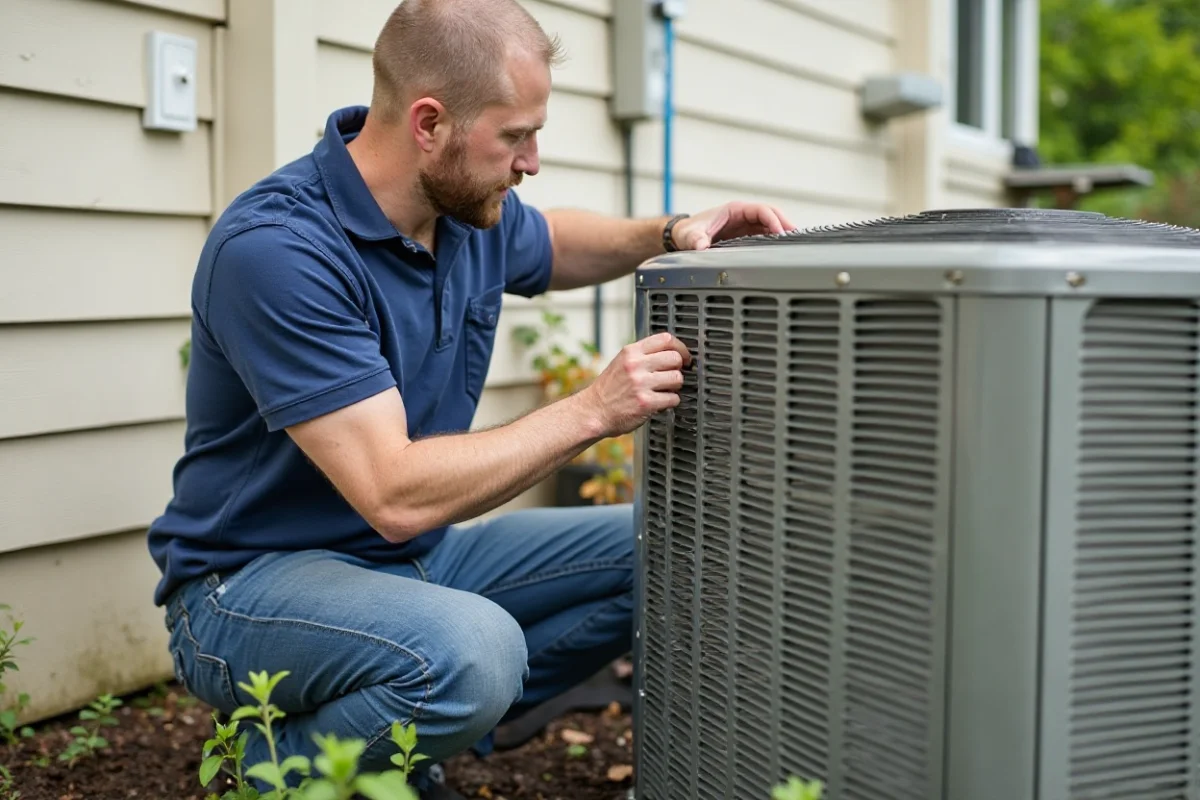Keep your heat pump running efficiently with simple heat pump maintenance tips like cleaning the unit, changing filters, checking refrigerant levels, adjusting temperature, and clearing the drain line.
A well-maintained heat pump runs quietly, uses less energy, and lasts longer—something every homeowner in Connecticut can benefit from.
In this guide, you’ll learn essential heat pump maintenance tips and when it’s time to call a professional for full system service. For professional heat pump servicing in Middlefield, CT, contact Direct Home Services at (860) 339-6001. We’re located at 57 Ozick Dr Suite i, Durham, CT 06422.
DIY Heat Pump Maintenance Checklist
Your DIY heat pump maintenance checklist should include cleaning the unit, washing or replacing air filters, checking coils, adjusting thermostat settings, and flushing the condensate drain line. These simple steps help improve efficiency, lower energy use, and prevent costly repairs.

1. Clean Your Heat Pump Regularly
Wipe down indoor panels and remove debris around the outdoor unit to keep airflow steady and prevent unnecessary system strain.
Your heat pump has to work harder when dust builds up on your indoor casing, air vents, or return grilles. That added strain increases wear and raises utility costs. Outside, grass, leaves, and yard waste can collect around the unit, block ventilation, and cause the system to overheat.
Use a damp cloth to clean dust from the indoor cabinet and a vacuum to clear around air registers. Outside, turn off the power and remove leaves or weeds by hand to keep the unit clear.
2. Inspect and Clean the Coils
Check your indoor and outdoor coils for dirt buildup, and clean them carefully to maintain efficient heating and cooling.
Your heat pump uses coils to absorb and release heat. When these surfaces are dirty, the system can’t transfer heat effectively, which leads to longer run times, higher energy bills, and poor comfort.
Turn off the system and gently brush or vacuum indoor coils if accessible. For the outdoor coil, rinse with a garden hose at low pressure. Never use a pressure washer on the units.
3. Replace or Wash the Air Filters
Clean or replace your heat pump filters every 30 to 60 days to keep airflow strong and avoid system strain.
Filters trap dust, hair, and debris before they reach the coils or blower motor. When filters get clogged, airflow drops, which forces your heat pump to work harder. This can lead to short cycling, overheating, and a noticeable drop in indoor air quality.
Most heat pumps use disposable filters that should be replaced monthly. If your system uses a washable air filter, rinse it gently with water, let it dry completely, and reinstall it securely.
4. Check Refrigerant Levels
Low refrigerant levels reduce your heat pump’s ability to heat or cool properly. This can lead to poor airflow, longer cycles, and higher energy use.
Your system relies on refrigerant to transfer heat between the indoor and outdoor coils. When levels drop, the heat pump runs longer, uses more electricity, and may still fail to reach the optimal temperature. In some cases, you’ll notice weak airflow, ice on the outdoor unit, or lukewarm air during peak seasons.
Only licensed HVAC contractors can legally test and recharge refrigerants. If you suspect low levels, don’t run the system and contact a nearby technician to inspect and refill the refrigerant.
5. Handle Minor Repairs Promptly
Address small issues early to prevent heat pump failures and avoid higher repair costs down the line.
Minor problems, such as loose wires, a failing capacitor, or a noisy blower, can escalate into expensive repairs if left unaddressed. Left unchecked, these issues may cause short cycling, inconsistent heating or cooling, and long-term damage to major components.
If you notice strange noises, uneven temperatures, or frequent shutoffs, schedule an inspection with a nearby HVAC company immediately before the problem increases.
6. Adjust Your Thermostat Settings Seasonally
Update your thermostat settings at the start of each season to match your comfort needs and avoid energy waste.
Your heat pump runs differently in summer than it does in winter. If the thermostat isn’t adjusted or calibrated correctly, the system may short-cycle, run constantly, or fail to keep temperatures consistent.
Check that your thermostat is set to the correct mode (heat or cool), and program schedules based on your routine. Replace batteries if needed, and consider upgrading to a smart thermostat for better control.
7. Flush the Condensate Drain Line
Clear your heat pump’s condensate drain line every few months to prevent clogs, water damage, or system shutdowns.
Water can back up into the system and trigger a safety shutoff when the drain line gets blocked by algae, dust, or debris. In some cases, it may cause visible leaks near the air handler or moisture damage around the unit.
To flush the line, locate the drain access and pour in a mix of equal parts white vinegar and warm water. Let it sit for 15–30 minutes, then rinse with clean water to flush out any buildup.
When to Call a Professional for Heat Pump System Maintenance?
Call a licensed HVAC contractor if your heat pump shows signs of low performance, unusual noises, or recurring issues.
DIY maintenance helps, but some tasks like checking refrigerant levels, testing electrical components, and deep cleaning require professional tools and training. If your system is still struggling after basic care, it’s time to schedule a professional heat pump maintenance and tune-up.
Schedule Heat Pump Maintenance with a Trusted HVAC Company Near You!
Even with consistent DIY care, your system still benefits from a professional inspection. A trained HVAC technician can spot electrical issues, test refrigerant pressure, and fine-tune performance before small problems turn into major repairs.
If it’s been more than six months since your last tune-up, now’s the time to book an appointment with Direct Home Services. We’re located at 57 Ozick Dr Suite i, Durham, CT 06422.
Call (860) 339-6001 for expert HVAC maintenance in Middlefield, CT, and keep your system running at its best all year.
FAQs
What affects the heat pump maintenance cost in Middlefield CT?
The cost depends on the system’s age, how often it’s serviced, and whether any worn parts need replacement.
How often should you schedule heat pump servicing?
Most HVAC professionals recommend heat pump servicing twice a year—once in the spring and once in the fall.
Do you need to service a heat pump if it’s new?
Yes. Even new heat pumps need regular servicing to maintain efficiency and keep the manufacturer’s warranty valid.
Why is my heat pump not heating properly?
If your heat pump isn’t heating well, the issue could be a clogged filter, low refrigerant, or a thermostat setting error. Outdoor temperatures, airflow restrictions, or a dirty outdoor unit can also affect heating performance.
How long do heat pumps last?
Most heat pumps last 15 to 20 years with regular maintenance. Factors such as usage, climate, and the quality of service can impact the lifespan of the system.
What maintenance does the outdoor unit of a heat pump need?
The outdoor unit needs regular cleaning to remove dirt, leaves, and debris that block airflow. Keep at least two feet of clearance around it and gently rinse the fins with a garden hose to maintain efficiency. Always turn off the power before cleaning or inspecting the unit.


